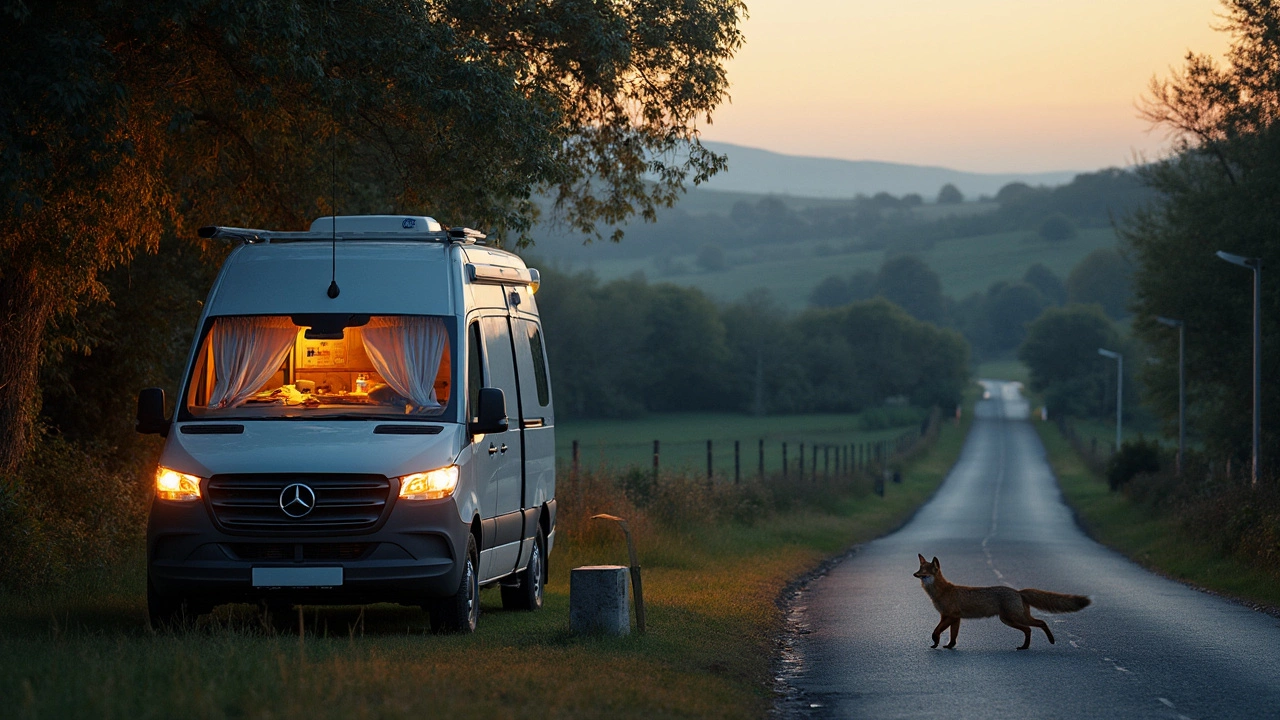The first thing you probably want to know: No, it’s not flat-out illegal to sleep in the back of your van in the UK, but it isn’t a total free-for-all, either. The legal side is a mix of old-school bylaws, land ownership rules, and a bit of good old British vagueness. There’s no single law banning van sleeping nationwide, but where you park makes a big difference.
Lots of folks do it—travellers, surfers, delivery drivers pulling over for a break. The issue is, if you sleep in your van somewhere you’re not really supposed to be, like a council car park marked “no overnight stays,” you could end up with a fine or even a knock on your window from the police or a security guard. Private land, lay-bys, and coastal car parks all have their own quirks. Councils and local landowners sometimes look the other way, other times they clamp down hard, especially in tourist hotspots during peak seasons.
- The Law: Is Sleeping in a Van Illegal?
- Picking the Right Spot: Where You Can and Can’t Park Overnight
- Smart Safety and Etiquette
- Best Tips for Hassle-Free Van Sleeping in the UK
The Law: Is Sleeping in a Van Illegal?
Let’s cut through the confusion: there’s no UK-wide law flat-out banning you from sleeping in the back of your van. But don’t get too comfy just yet—the rulebook isn’t that simple. A lot depends on where you park up for the night and how local rules are enforced. Your experience can be totally different from one place to another.
On public roads, sleeping in your van is mostly legal, unless there are specific local bylaws saying otherwise. For example, some councils put up clear signs in their car parks or on popular seafronts saying “no overnight camping” or “no sleeping in vehicles.” Ignore those and you might get a fine, a parking ticket, or even find your van clamped. In Scotland, the rules are a bit more relaxed thanks to their ‘right to roam’ laws, but even then, you can’t just sleep anywhere you please.
On private land, you need the owner’s permission. This could be a farmer’s field, someone’s driveway, or even some supermarket car parks where overnight stays used to be overlooked but are getting stricter now. Without permission, you’re technically trespassing, and while most landowners will just ask you to move along, it’s not unheard of for police to get involved if you dig your heels in.
If you’re using a sleep van UK for long trips, know that motorways and motorway service stations have special rules. While you can rest up, you usually can’t stay longer than a few hours—typically 2 hours free—and sleeping overnight can get you fined or moved on. Nobody’s keen for these spots to turn into unofficial campsites.
Some useful stats to get the picture:
| Location | Chance of being moved on/fined |
|---|---|
| Supermarket Car Parks | Medium-High |
| Motorway Service Areas | Low (if resting briefly) |
| Lay-bys (rural) | Low-Medium |
| Tourist Hotspots | High |
So, is it illegal? Not in the eyes of the law if you pick the right spot and obey local signs—just watch out for council rules, private property, and those areas marked “no overnight stays.” When in doubt, ask for permission or look up the spot online before you settle in for the night.
Picking the Right Spot: Where You Can and Can’t Park Overnight
This is where the rules get sticky. In the UK, where you park your van for the night matters way more than what you do inside. There are some dead giveaways for what’s okay and what will get you in a mess.
If you’re on private land, you need the landowner’s permission. That includes fields, farms, and even some empty car parks. Without it, you’re technically trespassing. Landowners have the right to ask you to move and in some areas, you might get a visit from the police if you stick around stubbornly.
Council car parks are a mixed bag. A lot have clear signs banning overnight stays or camping. Some are happy to have you for one night if you don’t make it obvious you’re setting up home—no chairs or barbecues outside the van. Check for local rules and cameras. It isn’t rare for councils to ticket or boot out anyone breaking these signs, especially in coastal spots in Cornwall, Devon, and the Lake District.
Lay-bys and motorway service areas are often used for quick overnight rests. Most service areas let you stop for 2-3 hours for free; after that, you might get charged or even fined. Lay-bys on main roads are often tolerated for emergency sleep, but not for a holiday stopover. If you leave rubbish, you put a target on your back.
Campsites UK are the safest option. No one will hassle you if you pay the fee. These sites have toilets, water, and sometimes WiFi. They fill up quick during summer and school breaks, so booking ahead helps, especially if you like the idea of hot showers.
- Always look for signs saying "No Overnight Camping" or "No Sleeping in Vehicles".
- If there’s a pay machine, see if overnight parking is mentioned.
- Check your surroundings—avoid obvious trouble spots like shopping centre car parks or busy town centres facing pubs or nightclubs.
Here’s a quick look at common options:
| Place | Likely Allowed | Tips |
|---|---|---|
| Service Station | Short stays only | Check signs, don’t overstay |
| Lay-by | Depends on area | More tolerated in rural spots, don’t be noisy |
| Council Car Park | Varies a lot | Read local signs, off-season is easier |
| Private Land | With permission | Always ask first |
| Campsite | Yes, with booking/fee | Best bet for no hassle |
Every region has hotspots where rules are tighter, especially in touristy areas. Locals complain, councils react. But if you keep a low profile and respect the location, you’re less likely to get moved on or fined. Remember, in Scotland, things are a bit looser—camping law up there is more forgiving thanks to the Scottish Outdoor Access Code, but even then, you should still be tidy and considerate.

Smart Safety and Etiquette
Staying safe and blending in is the real secret to hassle-free sleep van UK life. No one wants an unwanted wake-up knock or worse, trouble with the police. Let’s get straight to the things that make a difference.
First off, lock up. Double check every door and cover windows with shades or curtains so no one knows if you’re inside. That’s not just for privacy, but to avoid drawing attention. Police say thefts from unattended vans are way more common in tourist areas, so never leave valuables in plain sight. If your van looks lived-in, keep it tidy outside—mess and litter is a dead giveaway and is what winds up locals and attracts fines from local councils, especially in places that usually ban wild camping UK.
- Always use a carbon monoxide detector if you’re running a heater or cooking gear inside the van. Cheap and could save your life.
- Don’t set up furniture or BBQs outside—if you look like you’ve set up camp, you’re much more likely to be reported.
- Arrive late and leave early if you’re in a spot that isn’t a proper campsite. The less you stay in one place, the less likely you’ll get moved on or fined.
- Stick to areas where overnight parking is clearly allowed or at least tolerated. Follow local signs to avoid a £100+ penalty.
- If in doubt, ask. Most corner shop owners or pub landlords will tell you if folks park there overnight and if anyone actually cares.
It’s not just about rules. Etiquette matters. Don’t treat a country lay-by like your personal party area. Keep the music low, leave no rubbish, and never use bushes as a toilet (councils started closing car parks because of this—seriously). If you’ve got a portable toilet, use it and dispose of waste properly at a service point.
| Location | Break-Ins per Month |
|---|---|
| Cornwall Coast | 18 |
| Lake District National Park | 11 |
| City Centre Car Parks (London) | 27 |
| Isle of Skye | 7 |
Extra tip: keep a low profile when choosing a place to sleep. Stealth not only keeps you legal but also protects your stuff. If you feel unsafe for any reason—someone watching the van, weird noise—trust your gut and move on. Most seasoned vanlife laws UK people say they’d rather lose sleep than risk it.
Best Tips for Hassle-Free Van Sleeping in the UK
If you want to keep your sleep van UK experience smooth, it’s all about staying smart and respectful. Here’s what helps regular vanlifers avoid trouble and still get a good night’s rest.
- Plan Ahead: Hop on apps like Park4Night or Searchforsites. These have updated info about spots where sleeping in vans is welcome—or at least tolerated. They even flag places where folks have run into problems, which helps you steer clear of hot spots for fines or complaints.
- Use Proper Campsites: Don’t rule out official campsites. There are over 4,000 registered campsites UK-wide according to the Camping and Caravanning Club. Yes, you’ll pay, but you get showers, toilets, and zero hassle from wardens.
- Stay Low-Key: Keep the outside of your van tidy, shut curtains and don’t blast music or cook up a storm in the middle of a car park. Neighbours and locals are way more likely to complain if it looks like you’re setting up camp long-term.
- Avoid Hot Spots: Coastal car parks in Cornwall or seaside lay-bys in the Lake District almost always have strict overnight bans in summer. Look for smaller, rural lay-bys and avoid blocking driveways, farm gates, or showing up in the middle of a village where it looks suspicious.
- Check Local Bylaws and Signs: Always scan for signs like "No overnight sleeping" or "No camping." If it says you can't, don't risk it. Councils have stepped up enforcement in recent years, especially in touristy spots.
- Arrive Late, Leave Early: Turning up at sunset and hitting the road early morning minimises the chance of anyone even noticing you. This is a classic move among UK vanlifers hoping to dodge complaints or fines.
Keeping it legal and safe mostly boils down to common sense and blending in. Here’s a quick look at typical fines in popular regions so you know what’s at stake:
| Area | Typical Fine for Illegal Van Sleeping |
|---|---|
| Cornwall | £100 |
| Lake District | £70 - £100 |
| Brighton | £60 |
Most van dwellers agree: being tidy, polite, and moving on promptly is the best way to keep your vanlife laws UK trouble-free. If you’re not sure about a spot, always have a backup plan nearby—another lay-by, a 24-hour supermarket, or a local campsite UK.






